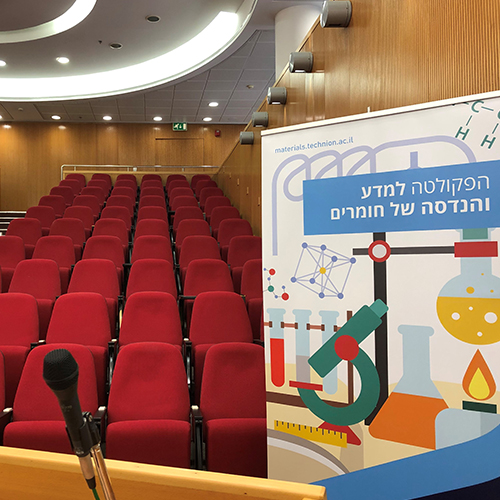
13/07/2025
אודיטוריום ע"ש דויד וואנג, בניין מידן, קומה 3
Ms. Noa Dekel Shechtman MSc candidate
Department of Materials Science and Engineering, Technion – Israel Institute of Technology, Haifa
BSc, Materials Science and Engineering.
This research focuses on a therapeutic approach called Sonodynamic Therapy (SDT), which utilizes ultrasound to induce cell death in cancer cells. SDT employs sonosensitizers, which are substances that generate reactive oxygen species (ROS) when irradiated by ultrasound. Elevated levels of ROS produced by SDT have the potential to effectively demolish cancer cells, offering a targeted approach to cancer therapy.
Our laboratory has recently developed novel sonosensitizers, a hybrid nanomaterial composed of amorphous titanium dioxide (TiO2) and amphiphilic poly (ethylene oxide)-b-poly (propylene oxide)
(PEO-PPO) block copolymer. These hybrid nanoparticles are synthesized through a sol-gel process that
yields spherical nanoparticles with excellent physical stability in water and controlled size. Moreover,
we demonstrated that these hybrid nanoparticles possess remarkable cancer cell-killing ability upon
exposure to ultrasound, which induces cancer cell apoptosis.
The primary objective of this research is to investigate the use of these hybrid nanomaterials for treating brain tumors. Therefore, the copolymers are modified with a shuttle peptide that enables them to cross the blood-brain barrier and target brain cancer cells4. This study examines the synthesis, nanostructure, and sono-responsiveness of these modified nanomaterials, including the production and characterization of the hybrid nanoparticles. Additionally, in vitro and in vivo experiments are conducted to assess the targeting efficiency of the modified nanoparticles.
Acknowledgements. This research was funded by the Israel Science Foundation (ISF Grant #327/19). Partial support of


